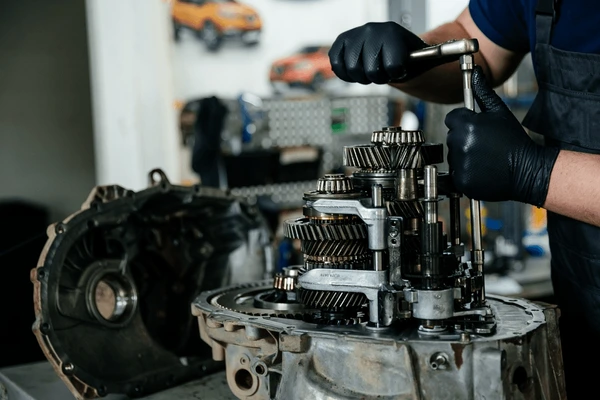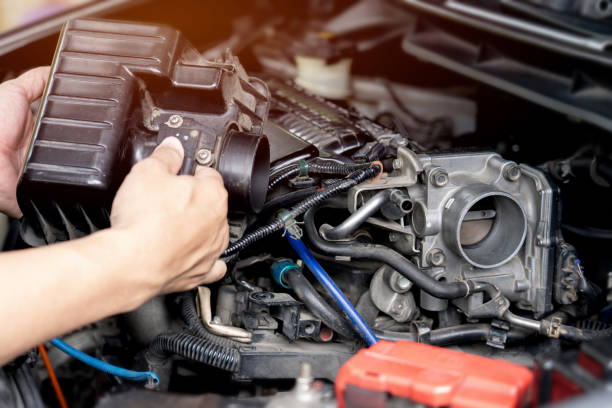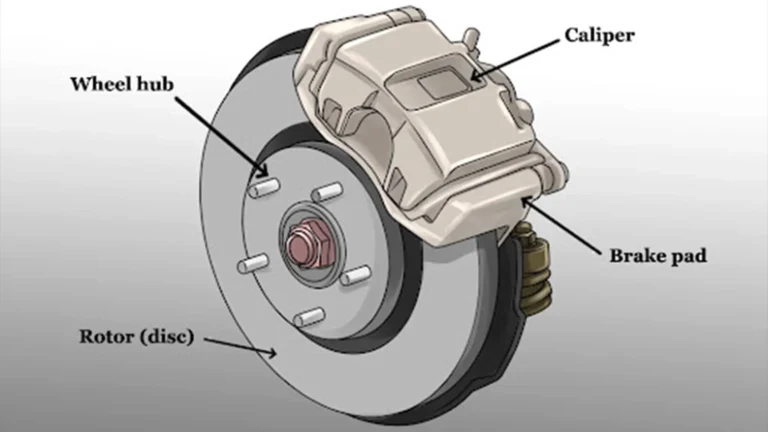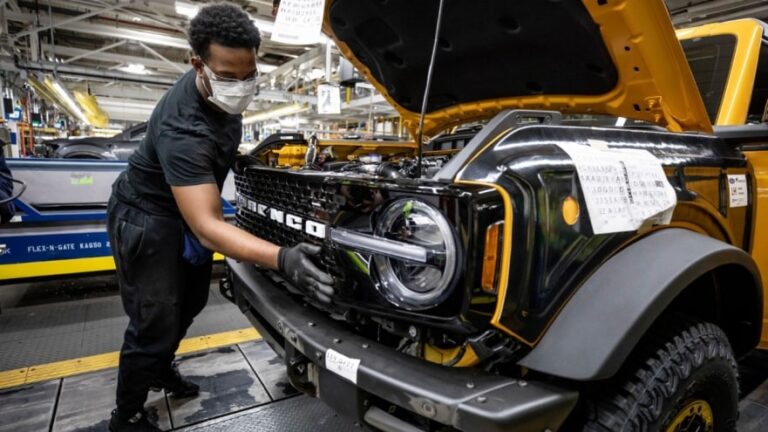Why Your Ford Fusion Shakes When Stopped: Causes and Fixes
If your Ford Fusion shakes when stopped, it can be both annoying and concerning. This issue may stem from various causes, including engine problems or worn parts. In this guide, we’ll look at common reasons for the shaking and how to fix them, helping you keep your car running smoothly.
If your Ford Fusion shakes when stopped, it may be due to engine issues, bad spark plugs, or worn-out motor mounts. Checking these parts can help identify the problem and guide you to the right fixes for a smoother ride.
In this post, we’ll talk about “Why Your Ford Fusion Shakes When Stopped: Causes and Fixes.”
Table of Contents
Brief overview of the problem.
A shaking Ford Fusion when stopped can indicate several issues. Common causes include engine misfires, unbalanced tires, or worn motor mounts. Identifying the exact problem is important for ensuring a safe and comfortable driving experience.
Why it’s important to address the shaking issue.
Addressing the shaking issue is important for safety and comfort. Ignoring it can lead to more serious problems, increased repair costs, and a less enjoyable driving experience. Timely fixes help keep your Ford Fusion in good condition.
Understanding Engine Vibration

How engine vibrations are normal to some extent.
Some engine vibrations are normal due to moving parts and combustion. A small amount of shaking is typical, especially at idle. However, excessive vibrations may indicate a problem that needs attention to ensure smooth operation.
Also read: Is the Jaguar 5.0 a Ford Engine?
When it becomes a problem.
Vibrations become a problem when they are strong, constant, or unusual. If you notice shaking that increases with speed or affects the steering, it could signal engine issues or other mechanical problems that need immediate attention to avoid further damage.
Common Causes of Shaking When Stopped
Engine misfire
An engine misfire happens when one or more cylinders fail to fire properly. This can cause shaking, rough idling, or reduced power. Common causes include faulty spark plugs, fuel issues, or problems with the ignition system that need fixing.
Faulty spark plugs
Faulty spark plugs can lead to engine misfires, causing shaking and rough idling. They are essential for igniting the fuel-air mixture in the engine. Replacing worn or damaged spark plugs can improve performance and reduce vibrations during driving.
Clogged fuel injectors
Clogged fuel injectors can cause various problems in your Ford Fusion, including shaking and poor engine performance. When they become clogged, they can’t work properly, leading to issues.
Engine Misfire: A Key Cause
Explanation of engine misfires.
When one or more cylinders don’t ignite correctly, an engine misfire happens.. This can lead to shaking, reduced power, and rough idling. Causes may include faulty spark plugs, fuel problems, or ignition issues that need fixing.
Why misfires lead to shaking.
Misfires lead to shaking because the engine’s power is uneven. When some cylinders don’t ignite, the engine struggles to run smoothly. This imbalance causes vibrations, especially at idle or low speeds, making the car feel unsteady.
How to detect misfires.
To detect misfires, listen for rough engine sounds and feel for shaking while driving. Warning lights on the dashboard, like the check engine light, can also indicate a misfire. A mechanic can use special tools for further diagnosis.
Worn Motor Mounts

Motor mounts’ function in engine stabilization.
Motor mounts hold the engine in place and reduce vibrations. They absorb engine movement, helping to keep the vehicle stable and comfortable while driving. Good motor mounts ensure a smooth ride and prevent shaking or noise.
Also read: Ford VIN Towing Calculator Not Working: Causes and Fixes 2024!
Signs of worn-out motor mounts.
Signs of worn-out motor mounts include excessive engine movement, loud noises during acceleration, and increased vibrations felt in the cabin. You may also notice your vehicle shaking when starting or stopping. These symptoms indicate it’s time for a replacement.
How to fix or replace motor mounts.
To fix or replace motor mounts, first, lift the vehicle and secure it safely. Remove any parts blocking access. Unbolt the old mounts and install new ones, ensuring they are tightened properly. Before lowering the car again, make sure everything is in working order.
Faulty Spark Plugs
Importance of spark plugs in engine performance.
Since spark plugs ignite the fuel-air mixture, they are essential to engine performance.e. Properly functioning spark plugs ensure smooth starts, better fuel efficiency, and increased power. Worn or faulty spark plugs can lead to misfires and reduced engine performance.
How faulty spark plugs cause vibrations.
Faulty spark plugs can cause vibrations by failing to ignite the fuel-air mixture evenly. This leads to engine misfires, creating an imbalance in power delivery. As a result, the vehicle shakes, especially during idling or acceleration.
Checking and replacing spark plugs.
To check spark plugs, remove them and inspect for wear or damage. Replace them with fresh ones if they are worn out or unclean. Ensure they are properly gapped before reinstalling to maintain engine performance.
Clogged Fuel Injectors
What fuel injectors do.
Fuel injectors deliver the right amount of fuel into the engine’s cylinders. They spray fuel in a fine mist, mixing it with air for combustion. This process helps the engine run smoothly and efficiently.
How clogging affects engine performance.
Clogging affects engine performance by restricting fuel flow, which leads to uneven fuel delivery. This can cause rough idling, reduced power, and poor fuel efficiency. When the engine doesn’t get enough fuel, it struggles to run smoothly.
Transmission Issues

How the transmission system affects overall vehicle smoothness.
The transmission system affects overall vehicle smoothness by ensuring smooth gear changes. If the transmission struggles or slips, it can cause jerking or vibrations. A well-functioning transmission allows for seamless acceleration and braking, improving the overall driving experience.
Also read: Are Jeep and Ford Wheels Interchangeable ? Complete Guide 2024!
Checking and fixing transmission-related issues.
To check transmission-related issues, start by inspecting the fluid level and condition. Look for leaks or unusual noises. If problems persist, consult a mechanic for a thorough inspection and necessary repairs to ensure smooth operation. Regular maintenance helps prevent issues.
Vacuum Leaks
What a vacuum leak is.
A vacuum leak occurs when air enters the engine outside of the normal air intake system. This extra air can disrupt the fuel-air mixture, causing rough idling, reduced power, and poor fuel efficiency. Detecting and fixing leaks is important for engine performance.
How it impacts idle smoothness.
A vacuum leak impacts idle smoothness by allowing extra air into the engine, which disturbs the fuel-air mixture. This can cause rough or uneven idling, making the engine feel unstable and leading to increased vibrations while stopped.
Exhaust System Problems
How exhaust problems can cause the car to shake.
Exhaust problems can cause a car to shake due to blockages or leaks. These issues disrupt the flow of exhaust gases, leading to pressure changes. As a result, the engine may struggle, causing vibrations and shaking while driving .
Dirty Air Filters
How a dirty air filter disrupts engine airflow.
A dirty air filter disrupts engine airflow by blocking clean air from entering the engine. This lack of airflow affects combustion, leading to reduced power, poor fuel efficiency, and rough idling, which can cause the engine to run unevenly.
Simple fixes by cleaning or replacing air filters.
Cleaning or replacing air filters is a simple fix that improves engine performance. A clean filter allows more air to flow, boosting power and fuel efficiency. Regular checks and replacements can help keep the engine running smoothly and prevent problems.
Throttle Body Issues

Throttle body function in air intake.
The throttle body regulates the engine’s intake of air.. When you press the gas pedal, it opens to allow more air, which helps mix with fuel for combustion. This process is essential for engine power and responsiveness.
How a malfunctioning throttle body causes shaking.
When you press the gas pedal, it opens to allow more air, which helps mix with fuel for combustion. This process is essential for engine power and responsiveness.
Importance of Regular Maintenance
How regular maintenance prevents shaking.
Regular maintenance helps prevent shaking by ensuring all engine parts, like spark plugs and motor mounts, are in good condition. It also keeps fluids at proper levels and checks for issues, leading to smoother performance and a more stable ride.
Key components to check periodically.
Key components to check periodically include spark plugs, motor mounts, air filters, and fluid levels. Regularly inspecting these parts helps ensure your vehicle runs smoothly and can prevent issues that may lead to shaking or poor performance.
When to See a Mechanic
Signs that indicate you need professional help.
Signs that indicate you need professional help include loud noises from the engine, shaking while driving, warning lights on the dashboard, difficulty shifting gears, or poor fuel efficiency. If you notice these issues, it’s best to consult a mechanic.
How mechanics diagnose the problem.
Mechanics diagnose problems by listening to your description of symptoms and performing tests. They check for error codes, inspect parts visually, and conduct tests on fluids and components. This helps them identify issues accurately and recommend the right repairs.
Conclusion
In conclusion, if your Ford Fusion shakes when stopped, it’s essential to identify and fix the underlying issues. Regular maintenance and prompt attention to symptoms can ensure a smoother ride and better performance, keeping your car safe and enjoyable to drive. Don’t ignore any signs of trouble.
FAQs
How long does it take to fix engine shaking?
Fixing engine shaking can take a few hours to a full day, depending on the cause. Simple issues like spark plug replacement may be quick, while more complex problems could require more time for thorough repairs.
Can engine shaking cause long-term damage?
Yes, engine shaking can cause long-term damage if not addressed. It may lead to issues like worn parts, increased stress on components, and eventually expensive repairs if the problem continues.
What is the cost of fixing a shaking car?
The cost of fixing a shaking car varies widely, usually ranging from $100 to $1,000 or more. Prices depend on the cause, such as spark plugs, motor mounts, or transmission issues.
Is it safe to drive a car that shakes when stopped?
Driving a car that shakes when stopped is not safe. It can indicate serious issues that may worsen while driving, leading to potential accidents or further damage to the vehicle. It’s best to have it checked.
Can low engine oil cause the car to shake?
Indeed, a car that has low engine oil may tremble. Insufficient oil leads to poor lubrication, which can create engine friction and vibrations, affecting overall performance and stability.






2 Comments